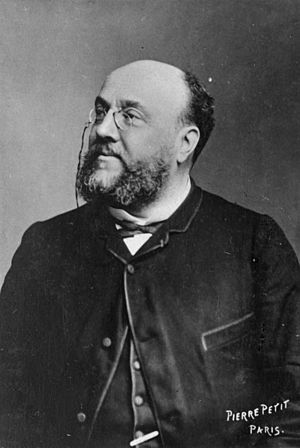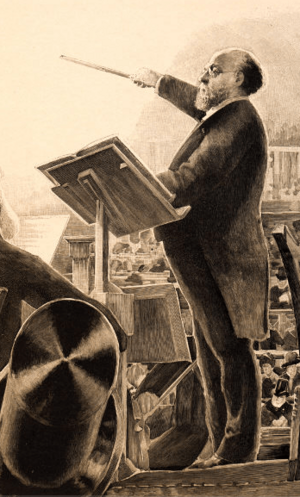Charles Lamoureux facts for kids
Quick facts for kids
Charles Lamoureux
|
|
|---|---|
 |
|
| Born | 28 September 1834 |
| Died | 21 December 1899 (aged 65) |
| Nationality | French |
| Education | Paris Conservatoire |
| Occupation | Conductor |
| Known for | Société Française de l'Harmonie Sacrée |
Charles Lamoureux (born September 28, 1834 – died December 21, 1899) was a famous French conductor and violinist. He is best known for helping to make classical music, especially the works of Richard Wagner, popular in Paris.
Contents
Charles Lamoureux's Life and Music
Early Life and Musical Start
Charles Lamoureux was born in Bordeaux, France. His father owned a café there. He loved music and studied the violin at the famous Paris Conservatoire. He was very talented and won a top prize (a premier prix) in 1854. After his studies, he became a violinist at the Opéra de Paris. He also joined the Société des Concerts du Conservatoire, a well-known music group. Charles helped start new music groups too. In 1860, he co-founded the Séances Populaires de Musique de Chambre. In 1872, he started a quartet, which grew into a small orchestra.
Bringing Oratorios to Paris
Lamoureux visited England and saw a large music festival dedicated to George Frideric Handel. He wanted to create something similar in Paris. He used money he received from his marriage to put on these concerts himself. This led to the creation of the Société Française de l'Harmonie Sacrée. In 1873, Lamoureux conducted the first performance in Paris of Handel's famous work, Messiah. He also led performances of other important pieces. These included Bach's St Matthew Passion and Handel's Judas Maccabaeus. He also conducted Gallia by Charles Gounod and Eve by Jules Massenet. When his money ran out, Lamoureux worked at the Opéra-Comique (in 1876) and the Paris Opéra (from 1877 to 1879). However, these jobs did not last long because he often had disagreements about how the productions should be done.
The Concerts Lamoureux
Lamoureux then made a deal with the Théâtre du Château d’Eau. He would give weekly symphony concerts there. He directed the Société des Nouveaux-Concerts, which became known as the Concerts Lamoureux, from 1881 until 1897. His son-in-law, Camille Chevillard, took over from him. These concerts were very important for making Richard Wagner's music popular in Paris.
Lamoureux was a strong supporter of Wagner's music. In 1887, he conducted the first French performance of Wagner's opera Lohengrin at the Eden-Théâtre. Some very nationalistic people, called Chauvinists, held street protests outside. They said performing German music was unpatriotic. Despite this problem, the opera was performed again at the Opéra two years later. Lamoureux held several important conducting positions. He was a conductor at the Conservatoire, the Opéra-Comique, and twice at the Opéra.
Later Years and Legacy
In 1893, Lamoureux toured Russia. He also visited London several times. He gave successful concerts with his orchestra at the Queen's Hall. On one occasion, he shared the stage with Sir Henry Wood and his orchestra. Charles Lamoureux died in Paris in December 1899. Before he passed away, his efforts led to Wagner's opera Tristan und Isolde finally being heard in Paris under his direction. After conducting one of these performances, he became ill and died a few days later. He was happy to see the music he had so bravely supported finally succeed.
See also
 In Spanish: Charles Lamoureux para niños
In Spanish: Charles Lamoureux para niños
- Berthe Marx
 | Georgia Louise Harris Brown |
 | Julian Abele |
 | Norma Merrick Sklarek |
 | William Sidney Pittman |


